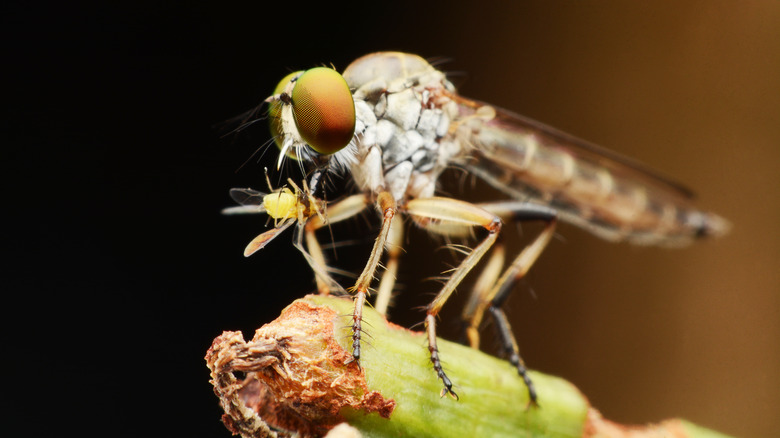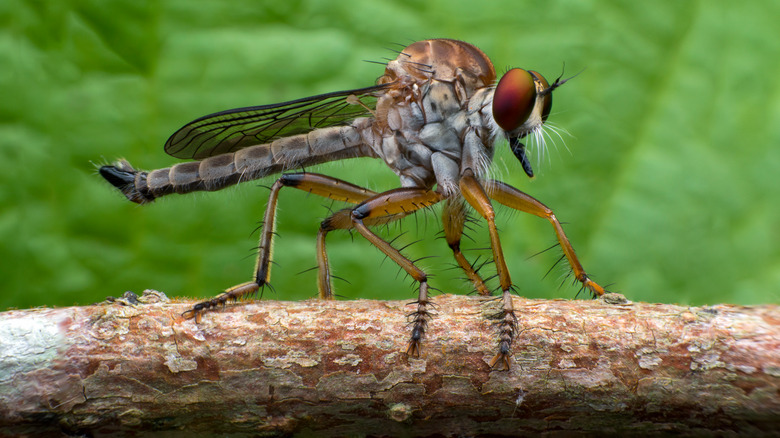The Type Of Fly You'll Want To Keep In Your Garden For An Unexpected Reason
Typically, finding flies in your garden means there's something not-so-ripe that needs to be removed. Most flies and other pests are not desirable for your garden since they can damage plants by spreading disease rather easily between plants — even plants outside of your garden. Whiteflies may even decide to consume some of your precious plants. Controlling and getting rid of whiteflies should be a priority. While it may be the case that you want to keep most flies out of your garden, there are some helpful flies that could be advantageous to have around.
Flies can be annoying, but they're also part of the ecosystem in most gardens and yards in general. It's not likely that you'll be able to banish them all because of their ability to move from one area to the next. Your goal, then, should be to attract just the good flies, including robber flies (Asilidae), also known as stiletto or assassin flies. These flies aren't the smallest of flies, but they are often distinctive for their hairy bodies. Their name is also rather fitting since they like to sneak up on prey. These flies are actually beneficial to your garden because they will keep other pests under control.
Why you'll want to welcome robber flies in
Robber flies aren't the same as a pesky fly on your burger at a picnic. Rather, they are aggressive flies that are looking for prey. They will munch on most other types of insects, including beetles and bees. They can be specifically helpful for controlling wasps and hornets, too, though they tend to prefer grasshoppers to other types of bugs. As adults, they may eat once or twice a day; in larvae form, they tend to focus on the smaller, potentially plant-damaging grubs.
Some of these insects that robber flies eat can be damaging to any environment, especially a garden. For example, grasshoppers will eat through your crops, and as they quickly grow and reproduce, they can be difficult to control. Some will damage fruit trees as well. Though wasps can offer some benefits to the garden, they are also likely to damage some plants. Even worse, wasps have painful stings, which can make weeding the garden far more difficult if they decide to call it home. By introducing and encouraging the presence of robber flies, you're helping to keep these other pest populations under control. While robber flies aren't likely to eliminate all of the good insects for your garden, they can help minimize large colonies that could otherwise stress your plants.
How to attract robber flies to your yard
With all the good they seem to bring, you may be looking for ways to bring robber flies into your yard, especially if you already have an insect problem that's harming your plants. Like every other pest, moderation is important — you don't want these flies to become too aggressive and wipe out important pollinators in your garden.
To attract robber flies, create a biodiverse environment. They are going to visit gardens where their prey is, which means you don't want to use insecticides that make the area unattractive to them. One key step is to incorporate some type of nectar-producing flower in your yard. Robber flies need protein from other insects, but when it comes time to lay eggs, the adults need access to sugar. You may wish to start a pollinator garden in your backyard to bring in both enough prey for robber flies and the flowers that bring in your all-important pollinators.
Finding a balance is critical to creating a diverse garden system that supports the growth of your plants so they can produce the fruit and vegetables you desire. You don't want to over-encourage these pests, either, since robber flies can bite people when they're annoyed or threatened by humans. So, if you see a robber fly, do not swat at it, and it should leave you alone.


